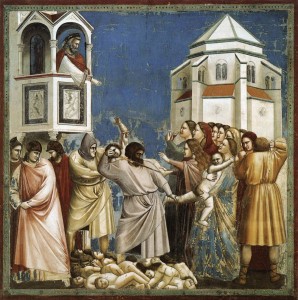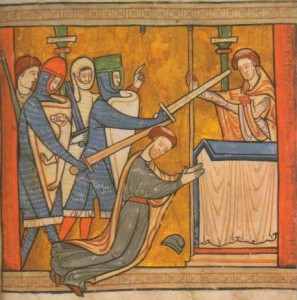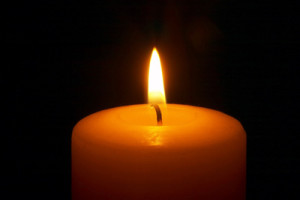Ash Wednesday marked the anniversary of the Writing the Dark Night Lenten project that my friend Alex and I developed with the help of the St. Paul’s Artists’ Guild. (You can still find the blog here). In honour of that awesome experience, here’s a piece on God as artist.
God the Artist; God the Theologian
God for someone like me – an artist and a very “Celtic†or holistically-oriented and creation-revering Christian – is best encountered through openness. Openness for me is best experienced through silence and contemplation, both of which I would name requirements for the Hebrew Bible scholar Michael Fishbane’s conception of theology. In his book Sacred Attunement, theology must speak profoundly to people where they exist in the current moment but also set forth a framework for all of existence. Scripture read as “primordial truth†is scripture empowered to continue to speak meaningfully for all people at all times. How this is done is impossible to tackle in its breadth of possibilities. What seems more important is the imperative that comes with theology: it must not be solely a retreat but praxis-oriented. Like art it should seek to transform directly and deliberately – unlike art the possibility of self-indulgence should never be entertained (while art can be self-indulgent and still transformative in its beauty, self-indulgent theology is usually not helpful to anyone beyond the self).
What is so beautiful about the paradigm Fishbane introduces is that, to me, it presents God as an artist. God in scripture is the constant (and often tormented!) author of “caesural moments†for the people. Interestingly, few of these moments are split along the binary of experience that Fishbane provides; they are deliberate and “natural.†Moments like the Flood (transforming Noah’s physical world – literally) and Jacob’s dream (aesthetically arresting[1]) transformed the inner and outer worlds of those who experienced them. God’s mediums can then be creation, silence, and words (to correspond with Fishbane’s painting, music, and poetry). God also has a very different sense of awareness than we do, naturally: “[A]rtists may live…continuously in these spaces of awareness, often disconnected from ordinary perceptions.†In God’s endorsements of Jacob and David, we see a refusal to play by the common rules of human perception and the establishment of a new way of thinking.
God was more than a simple still-life painter, though. The artist seeks to “cultivate the self†by reaching into the multitude of different expressions of reality and giving life to one (or a few). This rather reminds me of tohu wabohu, the oddly onomatopoetic phrase describing the earth before creation. In fact, it leads me to wonder and pursue my own brief theological reflection on God’s artistry: If we claim Scripture is necessary and authoritative (however that might be true), how do we affirm the diversity of voices and perceptions while still affirming that God created one earth? Perhaps, my Celtic mind giggles, we affirm the diversity in the tohu wabohu (out of which the earth is formed) and affirm the unity in the interconnectedness of all life on the planet. This is true art – we may at first feel overwhelmed by the thickness of sound emanating from the choir, but as we slip into the awareness that the voices are singing in harmony, we are instead fully transported into a very “thin place†indeed.
And of course the most wondrous thing to realize from this image of God as an artist was that God was also a theologian! The first task of a theologian according to Fishbane is to “provide a perspective that would place one firmly upon the earth and set forth a framework for the entirety of existence.†This to me describes God perfectly! Theology is also the integration, as stated above, of the unexpected “in-breaking†of nature and the deliberate nature of art.[2] Of course as a process theologian and someone who would heartily affirm the omnipotence of God I am delighted by the notion that God would spend time contemplating Godself. However, as a Christian, in this vision I also enjoy a slowly bleeding binary thought process that explores the vulnerability inherent in artistic openness (and so, in God).
[1] I recognize that what for me always manifests itself mentally as a beautiful and awe-inspiring image might indeed have been terrifying to Jacob! Here, then, I use a descriptive word that attempts to convey the hugeness of the emotion that must have accompanied this dream.
[2] The use of the word “in-breaking†is entirely deliberate here – I’m sure another paper awaits on the subject of Jesus as artist.
Today was my first morning prayer with the BCP. Since it’s Lent I also added the opening penitential section.
It takes a bit longer than BAS Morning Prayer, of course, and I’m still learning to navigate the book. I’d become quite adept with the BAS and now I’m back to square one, flipping through and discovering all the new prayers.
The format is fairly recognizable, although I’m aware of its more explicitly corporate nature. I’m also aware of the penitential language and themes present throughout. The Venite, for example, is included in full, unlike in the BAS, where only the first seven verses are included. This inclusion highlights the change in tone between the sections from one of praise and thanksgiving to a warning against “hardening one’s heart.â€
I don’t mind this particular change, not only because it’s Lent, but because this both preserves the integrity of the psalm and the entire thematic dance of the Hebrew Bible. While some argue (rather Gnostically), that the God of the Hebrew Bible is a tyrant, if it is read closely and critically, one most often finds that God dispenses punishment justly (in the theology of the author) and follows it with redemption and restored covenant.[1] The pattern goes, “because love, covenant.†Verse 9 emphasizes this:
They put me to the test,
though they had seen my works.
The acts of love are portrayed not as a prize to be doled out for obedience, but a way to be joined in a kind of mystical matrimony with God. If a person marries someone with both understanding that it will be a monogamous relationship and then goes behind the spouse’s back to sleep with someone else, the betrayal is clear and unambiguous. The anger of the betrayed is understandable, especially when the betrayer acts as though nothing out of the ordinary has occurred, or worse yet blames the betrayed for the act.
If we saw this situation occur on a reality show (note to self: write and pitch treatment for Survivor: Book of Exodus), we would likely side with the betrayed, and fully expect the offending party to be dumped. We may even clamor for some dramatic showdown.
The authors do sometimes give us this (think Korah, swallowed into the earth). However, it is just as likely that God will “give them up.†This Hebrew phrase is commonly used in cases of idolatry (even Paul users it in the infamous Romans 1:18 clobber text), and shows us a different God: a wounded, non-violent God who will nevertheless leave us to make our own choices.
You can only begin to imagine the joy of this God upon our return.
[1] Unfortunately some HB authors, like D, do not apply this pattern to outsiders like the Canaanites. Relief can be found in alternative voices (the HB includes many) and in midrash.
Hi, friends! This year’s Lenten practice is as follows:
I am limiting Facebook time to the evenings (after sunset).
I will celebrate Morning Prayer and sometimes Compline from the BCP instead of the BAS.
I will write around 500 words a day in this Lenten journal, which is actually a sacrifice because my keyboard is really screwed up and I’ve been using the onscreen keyboard, which takes forever.
I may post poetry too. :)
Follow me on my Lenten journey and/or start your own with the Daily Office Challenge! Try opening your Lenten days with Morning Prayer and closing with Evening Prayer or joining me for Twitter Compline!
Here is a link to the BAS and the BCP if you need help getting started, and here is where you can find the daily lectionary readings.
A prayerful Lent to all of you.
-Clarity
This is just a quick note to friends and fans that I’ve posted some more music on my Soundcloud page, and Mr. Man is gone so I haven’t figured out how to just post a permalink to it.
So for now, just take this post, and I’ll add a permalink later.
Hooray for Soundcloud!
LOVE and brand spankin’ shiny new tracks.
-C
Christmas is one of those times of the year when you can most clearly see the trappings of half-remembered religious observance among white Westerners. Even in notoriously secular B.C., most people [seem to] take for granted and even look forward to listening to standard musical favourites like “Silent Night,†“God Rest Ye Merry Gentlemen,†and “Joy to the World†that are explicitly religious.
The phrase “cultural echo†comes to mind during these times. It’s like seeing someone wear a cross as a fashion statement, or having trouble finding a seat in church on Christmas Eve. There are traditions that belong not just to Christians but to the culture at large. This is why I try to be welcoming to what are known among believers as “C & Eâ€[1] Christians. Although it may seem depressing that they come for the warm and comfortable glow of tradition rather than to be challenged by the scandalous reality of God’s inglorious entry into human flesh, who am I to deny their whole-hearted acceptance of Jesus’ invitation in Matthew 11:28: “Come to me, all you that are weary and are carrying heavy burdens, and I will give you rest.â€
And yet, of course, there are ways that this can be subverted in a healthy and kin(g)dom-promoting manner, and we sneakily found a way to write them right into our calendar!
Christmas, of course, is not just one day in the Christian calendar, but a whole season made up of twelve days (yes, that’s where the song comes from). When a new believer first becomes familiar with the liturgical calendar, she may find something very odd. Christmas, a special time of the year for us incarnational Anglicans, is bracketed by some strangely unsettling notions and remembrances.
On one side, we have the season of Advent. This is often billed as a time of expectation leading up to the “big event†on Christmas. In a traditional Anglican Church you will hear beautiful music and maybe enjoy the sight of children lighting the Advent wreath. However, the Scripture readings for those four weeks stand out starkly. Isaiah and Revelation feature prominently, and while both texts have passages which are comforting and familiar (think Handel’s Messiah), they tell us about a Christ who is to come again at the end of time, bringing judgement. Advent is a time of unsettlement, when we are reminded of the parts of the world that cry out for justice. Our prayers for Christ to come again are an admission that we don’t have everything right and need God’s strength and justice to heal us.
Christmas comes at the perfect time, because we are then brought into the stable and reminded that God did not choose to come among us as a vengeful and omnipotent warrior-king, but as a vulnerable infant born to unwed refugees. The story shows an excellent balance between God’s promise to restore all things and our commitment to sheltering/nurturing the divine when it is found on the roadsides of our world.

St. Stephen
Our awareness of this balance is heightened in the days that follow Christmas. The day after Christmas is the Feast of Stephen, as we learn in the carol “Good King Wenceslas.†What a lot of non-church folks may not realize, though, is that Stephen was the first martyr of the early Church. His death, by stoning, is recorded in the Book of Acts. We cannot stay in the stable because we must learn the great cost of discipleship in the world God has hallowed.
The next day, December 27th, is the feast day of St. John the Evangelist. We learn in the Gospel of John that “the light shines in the darkness, and the darkness did not overcome it.†(John 1:5). Likewise, in John 1:10-11, we learn that Jesus “was in the world, and the world came into being through him; yet the world did not know him. He came to what was his own, and his own people did not accept him.†John’s Gospel is full of conflict, and indeed the text itself has a dark history of misuse. The Word lives among us in the mud of everyday human conflict. We cannot stay in the stable, because if we do we will never recognize Jesus as he grows up into a tempestuous, troubling, and boundary-breaking adult.

Giotto
December 28th is the feast of The Holy Innocents. These are the unnamed children butchered by Herod’s soldiers in Matthew’s Gospel. They are considered by some to be the very first martyrs, which is most compelling considering they confess no creed. We cannot stay in the stable because the Holy Family themselves leave for Egypt in order to escape Herod’s wrath. We accept that those in authority are just as likely to be tyrannical as anyone else, and we pray for the ascent of a new authority that does not stem from intimidation but compassion and solidarity.
Finally, December 29th is the feast of St. Thomas à Becket, Archbishop of Canterbury from 1162 to 1170, brutally murdered by followers of King Henry II. Becket and Henry II had been engaged in conflict over ecclesiastical rights versus the rights of the state. Although Henry may not have intended for Becket to be murdered, once again we witness the struggle between institutions of authority, both secular and sacred. We cannot stay in the stable because we must work together to heal broken institutions.

St. Thomas Becket
The fact is that Christmas is not about warm fuzzy animals, a cute pink-cheeked baby, and a young golden-haired Mary. Jesus comes into a world that smells of manure. He is laid in a trough by his unmarried teenaged mother, and then whisked away as a refugee, member of a religious tradition viewed as primitive by many of the peoples that encountered it. He comes into a world that wants none of him or his message of love.
He came as a “minority,†if you will.
The Glorious Impossible is that it is all intentional.
This is God’s step forward in His dance with us, God’s extending of Her hand to us.
We cannot stay in the stable. If we do, no-one will hear our songs.
Eternal loving Mother God of light, love, and life, we stand in silent awe before you. In your form as a human infant is all holiness in all vulnerability, all power in all lowliness, all love in all evanescence, all eternity in all innocence. Entreat us, we pray, with plaintive cries, with placid gurgles, and with sweet, milkful smiles, to cradle the oppressed, the meek, the downtrodden, and the lonely in our hearts this day and always.
Merry Christmas to my friends, family, and readers. :)
-Clarity
Wow!!!
I only have one more semester to go!
It’s nuts to think about. What’s left is barely a semester anyway. All I really have left are a couple of weekend courses and one course I’m auditing for fun. I can’t wait to be able to bring my knitting to class!
It feels like I’ve been in school forever, and yet I can’t possibly imagine what it would be like to be working in the field I’ve been working up toward. ACPO seems like a distant dream, and yet I know it’ll rush up on me before I know it. I could say “I hope to God I’ll be ready,” but I really don’t think you can talk about it in those terms. It happens, and then you pick up the pieces.
I’m so grateful for everyone’s prayers and the strength lent to me in these four years.
I think it’s no coincidence that some of the most important work of my life occurred in Advent. Last year Advent 1 was the first meeting of my discernment group. This year, just beforehand, I got the good news from the examining chaplains, and on Advent 1 I handed in my position paper. Something new is being born, and I hope to God I will have help in bringing it forth into the world.
“He will come like child, he will come.”
-Clarity
Some time ago for my leadership studio class we had to consider the Christian virtues. I wrote a short piece on “diligence.” Now I think it might be fun to do the same for the other virtues! Here is the first one: the rest will follow soon!
On Diligence

Source: drschiffman.wordpress.com
“Diligence†is a virtue that I see as essential to the Church in our time, and something that I struggle with. I can throw myself into something whole-heartedly and never feel like it’s enough, or I can start with great ideas and have them stagnate because I either lose interest or don’t have the energy or time to exercise diligence, which usually leads to guilt. Sometimes I know I need to slow down in order to recognize diligence, but I often worry that people think I’m lazy or incapable if I take time to do things slowly. Oddly enough, there’s another translation of spoudÄ“, the Greek word for “diligenceâ€, which is “hasteâ€. “Haste†is something I believe I absorbed in some of my first years in school, where I would be chastised for taking too long to finish things. I internalized the idea that most people expected things to be done quickly, especially authority figures, and unfortunately that led to some anxiety when a task took me longer than it took others, especially things like math or logic-based thinking, which has always been a growing edge for me. I also became someone who got frustrated if I felt progress was being impeded and would sooner give up on a stalled project than exercise diligence to make sure it came out late, but well done. I like quick results – like many people in the world. It was a great relief then, to encounter the spirituality of mindfulness, and moving thoughtfully through tasks. I still struggle with it, though, but at least I know it’s a struggle. The “P†in my Myers-Briggs typology thanks me when I do this.
It’s not only important for my own peace of mind and development that I continue to strive for diligence in my daily life, work, and prayers. When I trace the term in Scripture, I see it as being deeply connected to one’s calling as a Christian, particularly in the Epistles. In the second letter of Peter, diligence is needed in order to bring about a string of other virtues that all work together and support one another – goodness, knowledge, self-control, endurance, and godliness. I draw strength from the Jesus of Mark, whose disciples are painted as a bit dense. Jesus never gives up, even when it becomes clear that they’re not going to understand his full teachings until it’s too late. In Romans, it’s the mark of a leader – crucial to the exhortation of others. This idea is particularly appealing to me. My greatest joy, gift, and task, is proclaiming the Good News of God in Christ Jesus. I love nothing more than to, when invited, share with someone the amazing reconciliation that Christians proclaim has happened in Jesus, and doing so in such a way as my joy is infectious, not simply inspiring new believers but encouraging long-time believers as well. I seem to have boundless stores of energy to devote to this particular part of my ministry, and in this case I do not lack in diligence. While I have plenty of other failings as a person of faith, I feel that my strength lies in living a life that is joyful for the great gift of God in Christ, and the great gift of God in love. Diligence in living and proclaiming this never seems to wane.
What can I do about the places where my life lacks diligence? I found a paper online that explores the concept of Christian diligence and offers some passages that supposedly tell one where to draw diligence. I was a bit cautious – proof-texting is something about which I’ve come to feel very skeptical – but I found an interesting kernel that bore more thought. The passage cited was in 2 Corinthians Chapter 7, where Paul mentions “godly grief.†The phrase is in reference to what appear to be feelings of guilt and anxiety over the sins of the community at Corinth, but is labeled “godly†because the community is hence called to repent. While this reading gives me some trepidation – I know for myself that guilt usually plunges me into futility – I do think its focus on repentance is helpful, and I am heartened that for Paul it is most important that the sinful person who had been pushed out of the community is restored. Clearly forgiveness is the main drive here, and repentance the main goal of this godly grief. Instead of languishing in shame – and some types of shame can be quite healthy, after all – mindfulness of oneself and moments where diligence is lacking can lead to repentance. Perhaps the simple drive to start fresh or approach things from a different perspective is enough. And of course, I hope in God. My diligence in faith grows stronger every day. I expect that will be enough to hold onto for the long haul.
I decided to dive into the vault and pull out some old stuff I wrote for school! I promise I will try and come up with some new new material very shortly.
This piece was written for my “integration and formation class.” We were introduced to the BBC’s intriguing podcast Thought for the Day, and told to write our own. I didn’t get a chance to record mine, but here’s the text.
THOUGHT FOR THE DAY
“Let anyone with ears to hear, listen!†This doesn’t seem to fit our world as it used to – perhaps now it would be more common to hear, “Let anyone with fingers, click!†It is all too easy to be caught in a cycle of learning new things online, and as I click through site after site I sometimes find myself intrigued beyond measure by the Internet’s many answers to Dear Abby in the form of endless blogs dedicated to reader-submitted questions, or indeed by one of the truly perplexing oddities of the Internet, searchoftheday.com, which chronicles the bizarre questions asked daily of our newest sage, Google. Some are just weird or silly: “Is it okay to drink boiling tap water?†or “Recipe calls for vanilla pudding mix I don’t have it Can I just leave it out?†Some, though, are unsettling, even distressing: “It’s been three years and I still don’t love my adopted son,†and “What are some ways to stop yourself being gay.†What was once solely the domain of trusted friends, relatives, the library, or (God forbid) professionals has now become largely the domain of the information superhighway, with all of its breathtaking scenery, all of its potholes, and all of its roadkill. The sheer wealth of choices and variety in information may seem like an unqualified blessing, but of course it isn’t, for our choices cannot be sorted into worthwhile and useless or even harmful information.
How we react to the presence of these many voices in our cultural fabric is up to us. Celebrations or pearl-clutching will not change the fact that people who want to learn are more and more often going to the Internet before they go to anyone else. If people are consulting less with physical living human documents like friends and relations – particularly elders – and consulting more with the manufactured information presented online, what does this mean for the Church? We largely still meet in what kids these days call “meatspace,†and many of us are repelled by the notion of switching entirely to worship and communion online. Furthermore, how are we to navigate in a world that is post-Christendom, where we are forced to compete with many other meaning-makers, and on a global level unprecedented in human history? Those of us who affirm the majesty of God should not hope to claim that God cannot or chooses not to ever move through systems outside the Church. Perhaps, then, we can greet this with some sense of relief…and purpose. If Jesus had truly been striving for univocality, he would never have told parables, never have engaged with the rulers of the day, and would have had no disciples. We people of faith now have the same platform as everyone else, unable to go unquestioned ever again – and what a gift. Now that we are forced into the increasing capitalism of our world, we can plunder the Egyptians by refining our product, just like everyone else. In refining, we must offer something that both meets a need and is different enough from everything else to avoid redundancy. We already have the core of a brilliant product, which meets a universal need: a need that is not only the answer to but the reason for every other need we have, and a need before need itself. Let us borrow but not absorb, cultivate but not colonize, and let us shout, “Let anyone with ears to hear, listen.â€
I’m going to ACPO.
It’s completely insane to comprehend. I opened the letter with my husband on the phone. I’m not entirely sure he knew why I had to do it that way, but I did. Up until this point (because there is always more around the corner) it was the most important letter I think I’d ever opened in my life.
Of course once I realized what it said I completely broke down. And I can’t even say why. I think, for me, I’ve been so emotional over each affirmation because it seems to confirm not only God’s presence, but God’s pleasure, because with each movement forward I feel more certain of my vocation (and with myself). It’s so difficult to know these things, and I spend so much time afraid of my own ambitions. I spend ages learning (and telling myself) that this is not the kind of work somebody earns the right to do. It’s about being called, and answering. And yet I still struggle with the sense that I will never be worthy of any mission God sets before me, even after visions and affirmation from others and countless papers exploring who I am and where my call is coming from.
It may sound cliche, but all I really want to do is dedicate my life to serving God. I would give everything that I have, even my life, to know with utter certainty that I am doing what God has ordained for me. Of course I will never know in this life, and I think that’s the point, because otherwise there would be no such thing as faith or her sister doubt.
I think both are essential to truly discerning God’s will.

Source: www.faithinterface.com.au
Despite all of the good-natured moaning from friends and loved ones on my behalf (“When are you going to knoooowww?“), I am certain of one thing: that everything has happened at exactly the right time. The 2nd of December (I think) marks the anniversary of my first meeting with my discernment group. It was also the day that I sent in my ministry position paper to be reviewed by the panel that will discuss it with me on December 9th.
And what better time to begin to determine God’s will than the season of Advent?
Whatever happens to me, I will always treasure this season as the one where I began this incredible journey, and I will try every year to remember and celebrate my calling, as Mary once did. And if I do become what I believe I am called to become, I will be ordained by a woman: our Bishop-elect is Melissa Skelton from the Diocese of Olympia. I can’t wait to meet her.
“My soul magnifies the Lord, and my spirit rejoices in God my saviour.”
-Clarity




